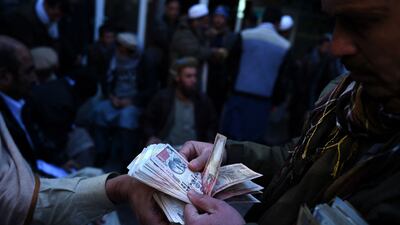As the Taliban are now in control of Afghanistan’s resources and institutions, one of the new regime’s most pressing issues is the economy.
Among the questions haunting many Afghans, and possibly outsiders, is how the hardline group will participate in the global financial system.
The Taliban is already under financial sanctions from the UN and the EU. Several people including new officials in their interim government are designated as terrorists and sanctioned by the US, which has also frozen around $9 billion of the Afghan government’s reserves.
And any institutions that will touch Taliban finances could be targeted.
“I think the complication we have now it is not clear what happens next," said Juan Zarate, who served as an assistant national security adviser during the George W Bush's US presidency, told The National. "It is not clear how the Taliban will be treated as a government. You know, there are some out there are talking about legitimating it, recognising it. There are others who are saying 'we will never recognise it, and it needs to be treated as a pariah'.”
The country’s economy is based mainly on aid from allies of the previous internationally recognised government.

The World Bank says foreign aid accounts for more than 40 per cent of the Afghan GDP since the US-led invasion and covered about 80 per cent of the government payroll.
For Mr Zarate, the author of Treasury's War: The Unleashing Of A New Era Of Financial Warfare, the important criterion to revive the Afghan economy is centred on whether the Taliban will prove pragmatic and change under the international financial pressure.
“Any time you have a coup, or a hostile takeover of a government, the international community or the US in particular takes measures to ensure that the central bank's reserves aren't being stolen or misused until there's sort of an appropriate transition plan,” he said.
Mr Zarate, who called the US withdrawal from Afghanistan a disaster and a fiasco, said the Taliban do not meet any international standards of government in issues such as human rights, diversity, gender and counter-corruption.







“If they're going to continue to be a terrorist group, to operate with the Haqqani Network and Al Qaeda, then they're going to be isolated, they're going to be pariahs," he said. "All of the requirements of the international system around transparency and accountability and traceability that everyone else has to live by should be applied to them."
Economists say the US is looking for economic leverage over the Taliban so it could engage in political diplomatic negotiations to arrive at a settlement over how they run the country given their extremist ideology and the operation of terrorist groups on Afghan territory such as ISIS-K.
International sanctions in this context are a major bargaining chip, which adds to the financial pressure of the continuing Afghani depreciation after the Taliban takeover – or $1=85.80 at the current rate.
Even before Taliban control, the economy was ailing after four decades of war and instability. A humanitarian crisis due to violence and severe drought has made matters worse for Afghans despite billions of dollars in foreign aid over the past 20 years.
Mr Zarate has not ruled out that the Taliban might resort to tactics they used in the past; namely, a war economy reliant on drug trafficking, synthetic drug production and illegal mining.
All of this, he said, has created pitfalls for anyone considering doing business in Afghanistan, even China and Russia, because of the full spectrum of risks as well as international sanctions.
“Who in their right mind will do business and invest in Afghanistan now?" Mr Zarate said. "There's going to be lots of people who will try to profit, there will be lots of people who will try to be spoilers. But in the context of legitimate actors trying to get either aid assistance or investment into Afghanistan, that is all on pause."


